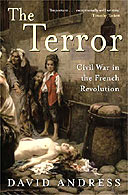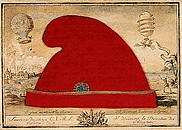Response Essay on the Terror Réplique
Par David Andress, University of Portsmouth

My thanks for this opportunity to respond to reviews of my book, The Terror: Civil War in the French Revolution, London, Little Brown, 2005 (1). I shall direct most of my attention to the thoughtful observations of Jean-Pierre Gross in the AhRf, and with the implications of some of his queries, before reflecting on some of the other points that have been raised by reviews elsewhere. Gross poses the question of how we are to understand the Terror as “phénomène stricto sensu”, which left me wondering if I could actually define what that meant. I would certainly not go as far as some and make the Terror conterminous with the fall of the monarchy, as if all that followed was indiscriminate horror. But nor I think can one limit it to the sort of pure ideological drive that Patrice Gueniffey seems to make it, or again the limited, almost humanitarian braking of popular impulse to slaughter that Sophie Wahnich has constructed – wishing, it seems to me, to praise the historical Terror by comparison to an unrealised, worse one which might have been. Jean-Clément Martin’s recent book comes close to some of my own thoughts on the matter, though his suggestion that violence had really infused the whole political landscape by 1793 is a little too vaguely apocalyptic to have my complete agreement. Probably there should be no “The Terror”, and we might speak of “invocations of” and “impulses towards” such a concept, rather than framing it as if it were an official title – after all, as Martin reminds us, despite the rhetoric, Terror was not put “on the order of the day” on 5 September 1793. But we are often reminded these days that there was no “The Renaissance”, either, nor any “Middle Ages”. “The Enlightenment” did not happen per se, and we are far from being certain that there was ever “Modernity”. This very anti-nominalism can itself become a distraction – sometimes a label is just a label. The Terror, officially or not, is what most historians understand to be the period between mid-1793 and mid-1794. Whether that understanding encapsulates a sense of it as a process, a programme, or just a set of dates, will depend on always-questionable historiographical judgments.

